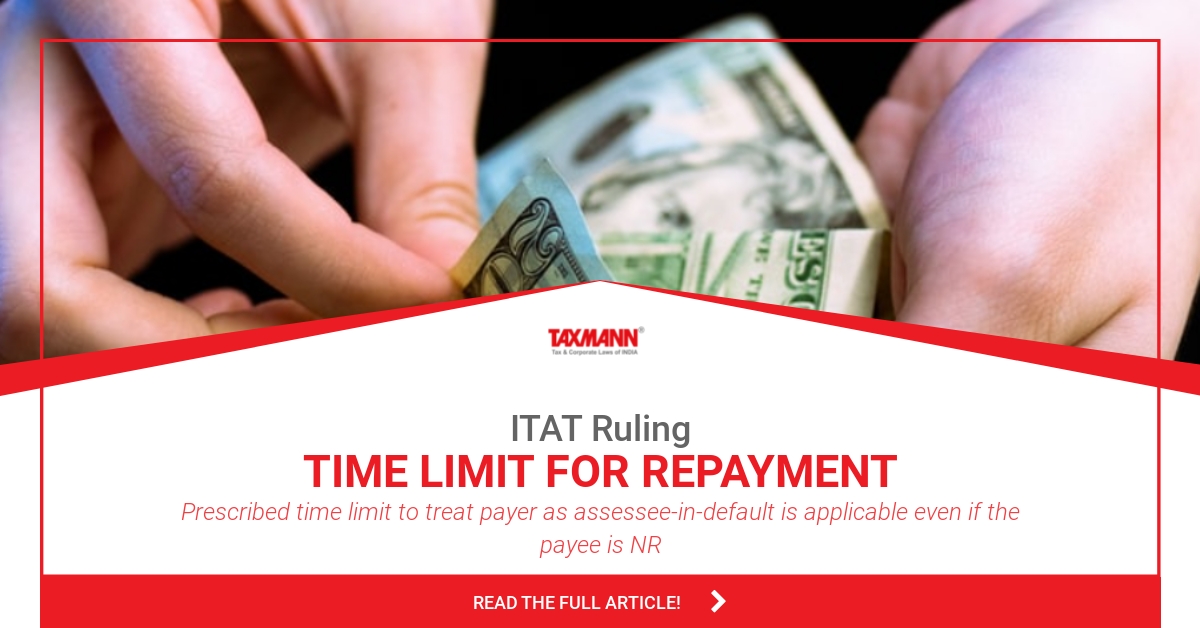Prescribed time limit to treat payer as assessee-in-default is applicable even if the payee is NR: ITAT
- Blog|News|Income Tax|
- 3 Min Read
- By Taxmann
- |
- Last Updated on 28 March, 2022

Case Details: Mphasis Ltd. v. DDIT - [2022] 136 taxmann.com 160 (Bangalore - Trib.)
Judiciary and Counsel Details
-
- N.V. Vasudevan, Vice President and Chandra Poojari, Accountant Member
- Porus F. Kaka, CA for the Appellant.
- K.V. Arivind, Adv. for the Respondent.
Facts of the Case
Assessee-company was engaged in providing information technology solutions and services specifically tailored to meet the requirements of industries.
It had entered into a ‘Master Services agreement’ with respective overseas group companies. It made payments to its group companies for software development services but without tax deduction at source. According to the assessee, the paid sums were not chargeable to tax and the relevant double taxation avoidance agreements.
However, Assessing Officer (AO) held that said payments were in the nature of ‘fees for technical services’. Accordingly, he passed an order under sections 201(1) and 201(1A). On appeal, the assessee argued that said order was barred by limitation. However, the CIT(A) rejected contentions of the assessee. Aggrieved-assessee filed the instant appeal before the Tribunal.
ITAT Held
The Tribunal held that the limitation period was prescribed under section 201 by insertion of sub-section (3) for the first time by Finance Act, 2009 with effect from 1-4-2010. Still, those provisions were applicable only when payments were made to ‘resident in India’. Regarding payments made to non-residents, no period of limitation is laid down in the Income-tax Act.
The absence of a limitation period to pass an order under section 201(1) where the payee is a non-resident will not empower the Assessing Officer to pass an order under section 201 at any time at his sweet will.
The Delhi High Court in case of Bharti Airtel Ltd. v. Union of India [2016] 76 taxmann.com 256 has held that the limitation period provided under section 201(3) would apply even in respect of non-residents.
Thus, when the payee is a non-resident, the proviso to section 201(3) prescribing a limitation period for passing an order under section 201(1) would apply. The orders passed beyond such limitation period would have to be declared barred by time and invalid.
Case Review
-
- Vodafone Essar Mobile Services Ltd. v. Union of India [2016] 67 taxmann.com 124/238 Taxman 625/385 ITR 436 (Delhi);
- CIT v. C.J. International Hotels (P.) Ltd. [2015] 56 taxmann.com 458/231 Taxman 818/372 ITR 684 (Delhi);
- DIT (International Taxation) v. Mahindra & Mahindra Ltd. [2014] 48 taxmann.com 150/225 Taxman 306/365 ITR 560 (Bom.);
- CIT v. NHK Japan Broadcasting Corpn. [2008] 172 Taxman 230/305 ITR 137 (Delhi) and
- CIT v. Bharat Hotels Ltd. [2015] 64 taxmann.com 325/[2016] 384 ITR 77 (Kar.) (para 20) followed.
List of Cases Referred to
-
- Bhura Exports v. ITO [2011] 13 taxmann.com 162/202 Taxman 88/[2014] 365 ITR 548 (Kol.) (para 7)
- Tata Teleservices Ltd. v. Union of India [2016] 66 taxmann.com 157/238 Taxman 331/385 ITR 497 (Guj.) (para 9)
- Tech Mahindra Ltd. v. ITO (International Taxation) [2018] 96 taxmann.com 357 (Mum.) (para 9)
- CIT v. Bharat Hotels Ltd. [2015] 64 taxmann.com 325/[2016] 384 ITR 77 (Kar.) (para 9)
- CIT v. NHK Japan Broadcasting Corpn. [2008] 172 Taxman 230/305 ITR 137 (Delhi) (para 9)
- Bharti Airtel Ltd. v. Union of India [2016] 76 taxmann.com 256/[2017] 245 Taxman 80 (Delhi) (para 10)
- Mahindra & Mahindra Ltd. v. Dy. CIT [2009] 30 SOT 374 (Mum.) (SB) (para 12)
- Vodafone Essar Mobile Services Ltd. v. Union of India [2016] 67 taxmann.com 124/238 Taxman 625/385 ITR 436 (Delhi) (para 20)
- CIT v. C.J. International Hotels (P.) Ltd. [2015] 56 taxmann.com 458/231 Taxman 818/372 ITR 684 (Delhi) (para 20)
- DIT (International Taxation) v. Mahindra & Mahindra Ltd. [2014] 48 taxmann.com 150/225 Taxman 306/365 ITR 560 (Bom.) (para 20).
Disclaimer: The content/information published on the website is only for general information of the user and shall not be construed as legal advice. While the Taxmann has exercised reasonable efforts to ensure the veracity of information/content published, Taxmann shall be under no liability in any manner whatsoever for incorrect information, if any.

Taxmann Publications has a dedicated in-house Research & Editorial Team. This team consists of a team of Chartered Accountants, Company Secretaries, and Lawyers. This team works under the guidance and supervision of editor-in-chief Mr Rakesh Bhargava.
The Research and Editorial Team is responsible for developing reliable and accurate content for the readers. The team follows the six-sigma approach to achieve the benchmark of zero error in its publications and research platforms. The team ensures that the following publication guidelines are thoroughly followed while developing the content:
- The statutory material is obtained only from the authorized and reliable sources
- All the latest developments in the judicial and legislative fields are covered
- Prepare the analytical write-ups on current, controversial, and important issues to help the readers to understand the concept and its implications
- Every content published by Taxmann is complete, accurate and lucid
- All evidence-based statements are supported with proper reference to Section, Circular No., Notification No. or citations
- The golden rules of grammar, style and consistency are thoroughly followed
- Font and size that’s easy to read and remain consistent across all imprint and digital publications are applied



 CA | CS | CMA
CA | CS | CMA
